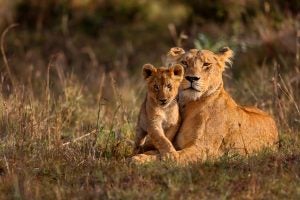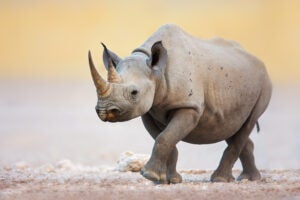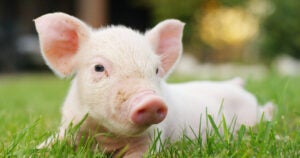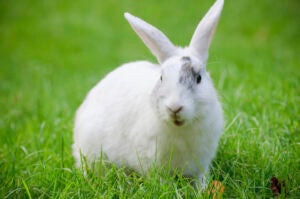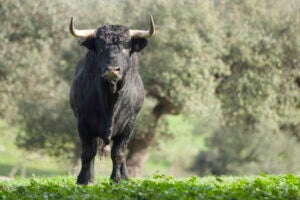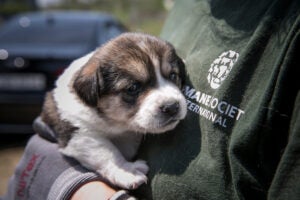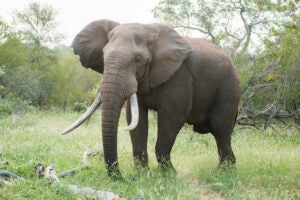
BRUSSELS —Animal protection campaigners have urged the European Commission to increase its cooperation with the Vietnamese authorities to tackle the illegal trade in African wildlife species. At an online conference, hosted by the Belgian Green MEP Saskia Bricmont, a report from the Environmental Investigation Agency (EIA) was presented, which highlighted the significant role of Vietnamese wildlife crime networks operating in Africa. It explored the scale of illegal trade from Africa to Asia facilitated by such syndicates and its impact on Africa’s wildlife and those authorities mandated to protect it.
The panel debate, which included representatives from the Vietnamese CITES Management Authority, Vietnam Customs and Environmental Police, the European Commission and a Nigerian wildlife protection NGO, addressed the shared challenges faced by law enforcement authorities in Vietnam and Nigeria in disrupting transnational criminal networks trafficking wildlife from Africa to Asia. During the discussion, the panel looked at how Vietnam can further tackle its role in wildlife crime and sought to identify ways in which the EU could support Vietnam to achieve this, including through the provisions of the EU-Vietnam Free Trade Agreement (EVFTA).
Belgian MEP Saskia Bricmont (Greens/EFA), who hosted the event, said:
“We are in the midst of a global biodiversity crisis. Urgent and concerted action is needed to clamp down on the trafficking of wildlife. The EU-Vietnam trade deal explicitly commits both Parties to adopting and implement appropriate effective measures to bring about a reduction of illegal trade in wildlife, such as awareness raising campaigns, monitoring and enforcement measures. I urge the European Commission to reach out to the Vietnamese government to offer both financial and technical assistance to help them combat the scourge of wildlife trafficking, which is pushing so many species towards the brink of extinction.”
Mary Rice, Executive Director of the Environmental Investigation Agency, said:
“Vietnam has made sterling efforts, such as revising its Penal Code to significantly penalise wildlife crime, to tackle the illegal wildlife trade in-country. However, Vietnam’s reputation is tarnished by the fact that it is the primary destination for illegal wildlife products sourced from across Africa and shipped by criminal networks directly or indirectly to meet the demand in Vietnam and beyond. These networks are accelerating the decline of Africa’s biodiversity and are exacerbating corruption and weak rule of law in many source and transit countries in the continent. It is unfortunate that the actions of a minority of Vietnamese citizens—and not to mention the complicity of EU citizens in this wildlife trafficking too—are sullying the country’s reputation and undermining their efforts to stamp out the illegal trade.”
Dr Joanna Swabe, senior director of public affairs for Humane Society International/Europe notes:
“The EU also needs to step up to help the African nations whose wildlife populations are being blighted by poachers and organised criminal networks seeking to profit from the illegal trade in endangered species, and most certainly needs to better penalise EU citizens who are involved in this heinous trade. For example, we have recently seen a case involving both Polish and Vietnamese nationals who have attempted to launder rhino hunting trophies imported legally into the EU into the Southeast Asian rhino horn trade. In addition to increasing European collaboration with and providing more support to the Vietnamese authorities, we also need to make sure that here in Europe wildlife crime does not pay. At present, this kind of crime is often viewed as being relatively low-risk and high income generating due primarily to the lack of severe penalties and low chances of being apprehended or prosecuted. We hope that the revision of the Environmental Crime Directive will help rectify this situation in the EU, as well as the updated EU Action Plan against Wildlife Trafficking providing greater resources and impetus for combating illegal wildlife trade.”
The event was organised by Humane Society International/Europe and the Environmental Investigation Agency. Speakers and panellists included:
- Mrs. Ha Thi Tuyet Nga, director for Vietnam CITES MA
- Mr. Jorge Rodriguez Romero, deputy head of unit at EU Commission for DG Environment
- Ms. Linh Nguyen, wildlife campaigner for EIA UK
- Mr. Wilson Ogoke, wildlife policy coordinator for Africa Nature Investors
- Moderator: Ms. Judith Kirton-Darling, chair of the Domestic Advisory Group for the EU-Vietnam FTA
Background
- Vietnam has made important progress in tackling wildlife crime, both in terms of improving as well as implementing relevant national legislation. For example, Vietnam’s revised Penal Code, which came into effect on 1st January 2018, significantly increases penalties for wildlife crime. There have also been a large number of cases resulting in deterrent penalties imposed on individuals convicted for wildlife crime offences.
- Despite this, a review of wildlife seizures originating from Africa made at seaports in Vietnam since 2018 highlighted that, not a single ivory and pangolin scale seizure at seaports in Vietnam has resulted in arrests, prosecutions or convictions, suggesting that investigations have been inadequate. Between 2018-21, the seized ivory and pangolin scales represent at least 2,200 dead elephants and 36,000 pangolins and provide yet more evidence that organised criminal syndicates continue to exploit Vietnam as a hub for illegal wildlife trade. Vietnam has also made several attempts to communicate with South African enforcement authorities in the interest of cooperating to crack down on illegal wildlife trade, but most of these have been unanswered.
- According to EIA seizure data, since 2015, Nigeria has become the primary African country implicated in ivory and pangolin scale smuggling incidents destined for Vietnam with seizures of at least 18 tonnes and 68 tonnes respectively. 2020 saw a drop in ivory and other wildlife seizures due to the global impact of the COVID-19 pandemic yet since 2021, approximately 17 tonnes of ivory and pangolin scales have been seized either leaving Nigeria bound for Vietnam or in Vietnam arriving from Nigeria, clearly demonstrating the ongoing illicit trade corridor.
- The Trade and Sustainable Development chapter of the EU-Vietnam Free Trade Agreement (EVFTA), which recently entered into force, includes a number of important provisions relating to wildlife protection. These provisions should allow the EU to assist Vietnam with reducing the demand for wildlife products and increasing the Vietnamese government’s enforcement capacity with the training and tools it needs to tackle the scourge of wildlife trafficking.
- In December 2021, the European Commission adopted a legislative proposal to revise the existing Environmental Crime Directive.
- The existing EU Action Plan against Wildlife Trafficking is currently being reviewed and a revised version is anticipated to be published by the European Commission by the summer of 2022.

